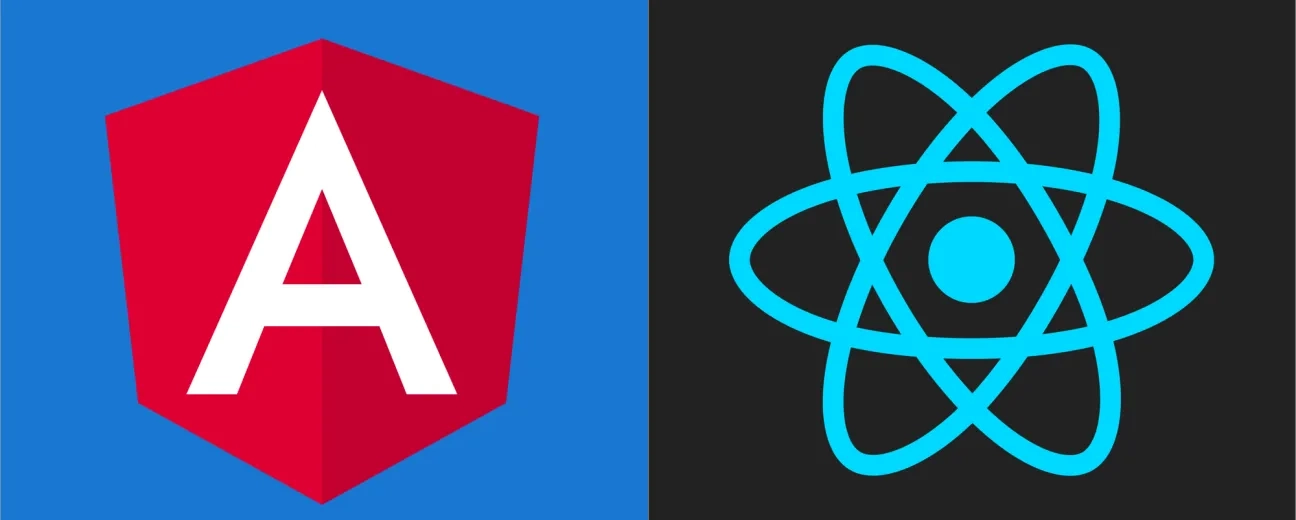
We’re excited to hear your project.
Let’s collaborate!

“Teach a man to fish and you feed him”.
In other words: don't expect us to reveal to you, by the end of this post, which is the ultimate winner of this Angular vs React's debate! Which is the right JavaScript technology for your next web project. For we won't!
Instead:
… so you should be able to answer THE question yourself: “Should I choose Angular or React for my next web project?”
Before you get to run your “magnifying glass” over these two popular JavaScript frameworks' key strong points and drawbacks, while comparing them against your own web project's requirements, allow us to briefly introduce them into the “arena”:
… built so that it can provide you (or your team of developers) with all the needed tools out-of-the-box! Where do you add that:
Otherwise, how could you have even considered comparing it to a full-blown framework like Angular, right?
React is many developers' top choice (and it sure has its own "fan club" within our Toronto web development team here, as well) whenever they're looking for an ideally lightweight, easy to tweak and twist framework for building dynamic, high trafficked (having data that's frequently changing) web apps!
Now that we've introduced the 2 “contestants” competing for the chance to be powering your new web project, let's go on and highlight their pros and cons (tackling multiple key aspects), so you can evaluate them yourself:
We need to admit that the 2 JS technologies are comparable from a performance perspective. Yet, we can still outline a few performance-impacting features inclining the balance to one side or another:
Angular:
React: constant components re-rendering can lead to performance issues, especially if it's an app handling a heavy load of data that you're planning to build
Angular: doesn't allow you too much freedom for customizing your app/website so that it meets your needs in the smallest details
React: highly flexible
Angular:
React:
Angular: it does come packed with “out-of-the-box” tooling and built-in best practices
React: although not a full-stack JavaScript framework as Angular, if React will be your final choice you can stay reassured: “when in need”, there's practically a third party library for pretty much everything
Angular: is built to scale easily, its design, as well as its powerful CLI, being the best proofs
React: designed to be easily tested and, implicitly, scalable
Angular:
React:
Angular: when it comes to the 3rd party library compatibility aspect of this Angular vs React “debate”, Angular's not doing so well: Typescript demands type definitions for every single library that you'd want to integrate
React:
Angular: used mostly for building enterprise, traditional form apps
React: it usually powers complex, high-performance sites/mobile or web apps featuring complex user interfaces, with multiple events, multiple inputs (each one “risking” to impact the other's screen)
Angular: comes packed with Ionic 2 and NativeScript
React: it's significantly better “equipped” for native rendering thanks to ReactWindows, Next.js, Alibaba, React Native
Angular: it does have a substantial size, which inevitably impacts its performance on mobile
React: smaller sized and, implicitly, conveniently lightweight
Angular: it's aimed at “boosting” the productivity of development teams working within a company
React: performance, flexibility, and simplicity are this JS technology's main “objectives”
Don't rush in to give your own verdict on this Angular vs React debate. Not just yet.
Not before you've asked yourself these key last questions strategically chosen to “cement” your final decision:
We strongly hope this little “questionnaire” here, along with our comparison tackling these two JS technologies' major aspects, will help you make up your mind faster. Help you make the right decision for your upcoming web project.
Final note: there's no such thing as “THE” perfect choice for each company, development team, project environment, and use case. Not even a “one size fits all” platform for all of your future web projects. Do keep that in mind!

We’re excited to hear your project.
Let’s collaborate!